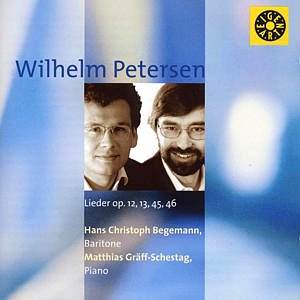Petersen was born in Athens, studied in Germany
and was a theatre conductor until he joined the German Imperial
Army and saw service on the Western Front. Having survived the
hostilities, unlike his composer countrymen Stephan and Kaminski,
he moved to Darmstadt in 1922. There he worked as a teacher and
later held similar positions in Munich. His opera Der goldne
Topf was produced at Darmstadt on 29 March 1941. There are
three each violin sonatas and string quartets as well as much
else. The five symphonies date from 1921, 1923, 1934, 1941 and
1957. His Grosse Messe was premiered in 1930 conducted
by Karl Böhm. In 1972 the Wilhelm Petersen Society was founded
to promote his music. The Society provided the funds for this
recording.
Petersen, during his twenties was an active member
of the circle of poet Stefan George. This he shares with the British
impressionist-symbolist composer Cyril Scott. Petersen however
showed no such sultry inclinations. His songs are in the Lieder
stream. Here is no moody introspective - nothing of Schoeck about
this. Petersen probes the emotions but does so in a way that suggests
not German forebears but instead Ivor Gurney and even Gerald Finzi.
This is especially true of the Shakespeare songs which, by the
way, are set and sung in German. Oddly enough the Op. 45 collection,
contemporaneous with Op. 46, has some expressionist leanings as
in the Klimt-like piano glimmer of the single Hölderlin setting
(tr. 12). Petersen can produce scarifying effects as in the ‘cruel
skies’ ridden hard by Begeman in Inschrift (tr.17). These
moments are comparable to similar episodes in Alan Bush's cycle
The Voices of the Prophets. At other times Petersen seems
intent on exposing his considerable gift as a tunesmith by largely
unadorned settings. This can be heard in the Shakespeare settings
and in many of the two Op. 12 Wunderhorn sets. There is
no trace of Mahlerian angst in this. The erste fassung
set (trs. 24-28) has more expressionist ‘spoor’ than the later
(trs. 16-20).
Begemann has a lightish baritone which he can
warm at will rather like Brian Rayner Cook. Among German colleagues
he is more of the Hermann Prey or Peter Schreier schools
than the Fischer-Dieskau fach.
The indispensable notes are by Wolfgang Mechsner.
They are in both German and English. The texts are only in German.
A valuable addition to the shelves of all
lieder enthusiasts as well as those for whom English song is their
centre of gravity and who are prepared to experiment.
Rob Barnett
OTHER PETERSEN RECORDINGS
Violin Sonata No. 2 in F op.22
Götzinger, Gerschwitz, Przybylla, Greff-Schestag - CADENZA
7890396
Grosse Messe
Bach, Belician, Schneider, Mainzer Domorchester - WERGO 6421533
